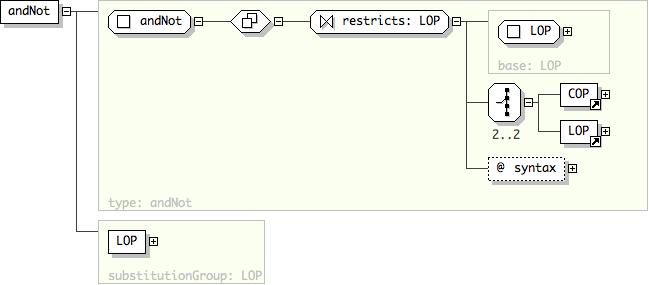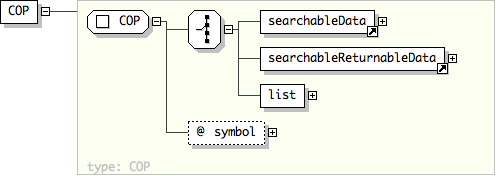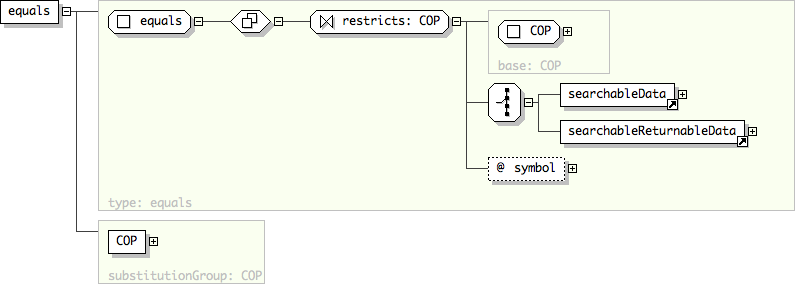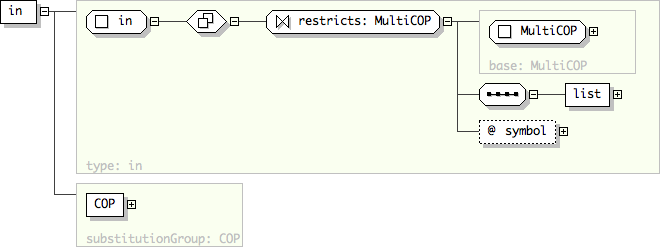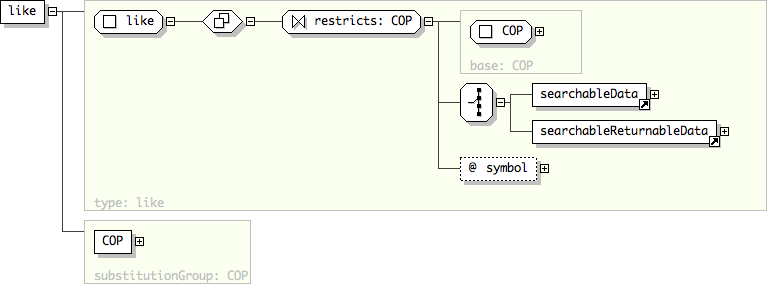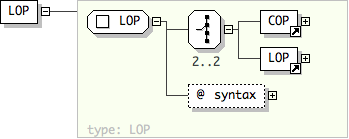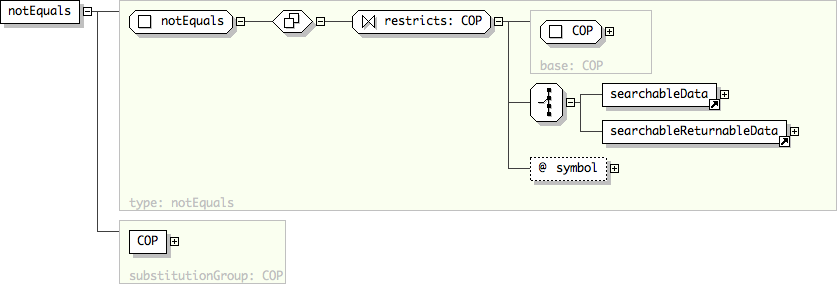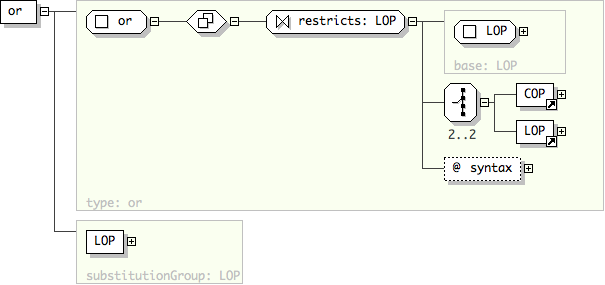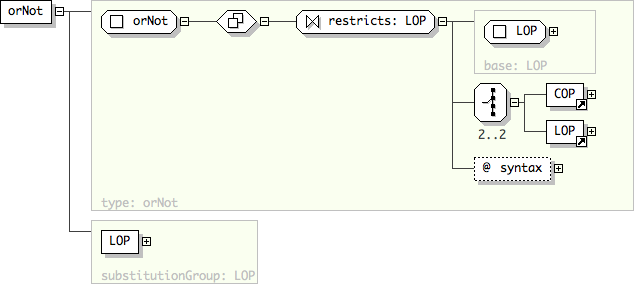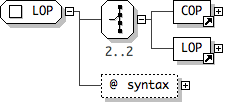Table of Contents
Target Namespace
http://digir.net/schema/protocol/2003/1.0
Element and Attribute Namespaces
Global element and attribute declarations belong to this schema's target namespace.
By default, local element declarations belong to this schema's target namespace.
By default, local attribute declarations have no namespace.
Documentation
$Id: digir.xsd,v 1.9 2005/11/16 18:39:54 rdg Exp $
Declared Namespaces
Prefix
Namespace
Default namespace
http://digir.net/schema/protocol/2003/1.0
xml
http://www.w3.org/XML/1998/namespace
xsd
http://www.w3.org/2001/XMLSchema
Schema Component Representation
<
xsd:schema
targetNamespace ="
http://digir.net/schema/protocol/2003/1.0 "
elementFormDefault ="
qualified ">
...
</
xsd:schema >
Element: and
This element can be used wherever the following element is referenced:
XML Instance Representation
<and
syntax="and
[0..1] " >
Start Choice
[2..2]
End Choice
</and>
Schema Component Representation
<
xsd:element
name ="
and "
type ="
and
"
substitutionGroup ="
LOP "/>
This element can be used wherever the following element is referenced:
XML Instance Representation
<andNot
syntax="and not
[0..1] " >
Start Choice
[2..2]
End Choice
</andNot>
Schema Component Representation
<
xsd:element
name ="
andNot "
type ="
andNot
"
substitutionGroup ="
LOP "/>
Element: COP
The following elements can be used wherever this element is referenced:
Name
COP
Type
COP
Nillable
no
Abstract
yes
Documentation
An abstract element provided as a base to group all comparitive operator elements.
XML Instance Representation
<COP
symbol="
xsd :string
[0..1] " >
Start Choice
[1]
End Choice
</COP>
Schema Component Representation
<
xsd:element
name ="
COP "
type ="
COP
"
abstract ="
true "/>
Element: data
The following elements can be used wherever this element is referenced:
Name
data
Type
anyType
Nillable
no
Abstract
yes
Documentation
An abstract element provided as a base to group all types of data. It is not expected that a concrete element of this level will ever be made.
This element can be used wherever the following element is referenced:
XML Instance Representation
<equals
symbol="=
[0..1] " >
Start Choice
[1]
End Choice
</equals>
Schema Component Representation
<
xsd:element
name ="
equals "
type ="
equals
"
substitutionGroup ="
COP "/>
This element can be used wherever the following element is referenced:
XML Instance Representation
<greaterThan
symbol=">
[0..1] " >
Start Choice
[1]
End Choice
</greaterThan>
Schema Component Representation
<
xsd:element
name ="
greaterThan "
type ="
greaterThan
"
substitutionGroup ="
COP "/>
This element can be used wherever the following element is referenced:
XML Instance Representation
<greaterThanOrEquals
symbol=">=
[0..1] " >
Start Choice
[1]
End Choice
</greaterThanOrEquals>
Element: in
This element can be used wherever the following element is referenced:
XML Instance Representation
<in
symbol="IN
[0..1] " >
</in>
Schema Component Representation
<
xsd:element
name ="
in "
type ="
in
"
substitutionGroup ="
COP "/>
This element can be used wherever the following element is referenced:
XML Instance Representation
<lessThan
symbol="<
[0..1] " >
Start Choice
[1]
End Choice
</lessThan>
Schema Component Representation
<
xsd:element
name ="
lessThan "
type ="
lessThan
"
substitutionGroup ="
COP "/>
This element can be used wherever the following element is referenced:
XML Instance Representation
<lessThanOrEquals
symbol="<=
[0..1] " >
Start Choice
[1]
End Choice
</lessThanOrEquals>
Schema Component Representation
<
xsd:element
name ="
lessThanOrEquals "
type ="
lessThanOrEquals
"
substitutionGroup ="
COP "/>
Element: like
This element can be used wherever the following element is referenced:
XML Instance Representation
<like
symbol="like
[0..1] " >
Start Choice
[1]
End Choice
</like>
Schema Component Representation
<
xsd:element
name ="
like "
type ="
like
"
substitutionGroup ="
COP "/>
Element: LOP
The following elements can be used wherever this element is referenced:
Name
LOP
Type
LOP
Nillable
no
Abstract
yes
Documentation
A logical operator clause. This is an abstract element to be substituted by concrete logical operator elements.
XML Instance Representation
<LOP
syntax="
xsd :string
[0..1] " >
Start Choice
[2..2]
End Choice
</LOP>
Schema Component Representation
<
xsd:element
name ="
LOP "
type ="
LOP
"
abstract ="
true "/>
Name
metadata
Type
Locally-defined complex type
Nillable
no
Abstract
no
Documentation
A container for provider metadata used in a response element.
XML Instance Representation
<metadata>
<provider>
[1]
?
<name>
xsd :string </name>
[1]
?
<accessPoint>
urlType
</accessPoint>
[1]
?
<implementation>
xsd :string </implementation>
[0..1]
?
<host>
[1]
?
<name>
xsd :string </name>
[1]
?
<code>
xsd :string </code>
[1]
?
<relatedInformation>
urlType
</relatedInformation>
[0..*]
?
<abstract>
xsd :string </abstract>
[0..1]
?
</host>
<resource>
[1..*]
?
<name>
xsd :string </name>
[1]
?
<code>
xsd :string </code>
[1]
?
<relatedInformation>
urlType
</relatedInformation>
[0..*]
?
<abstract>
xsd :string </abstract>
[0..1]
?
<keywords>
xsd :string </keywords>
[0..1]
?
<citation>
xsd :string </citation>
[0..1]
?
<useRestrictions>
xsd :string </useRestrictions>
[0..1]
?
<conceptualSchema
schemaLocation="
urlType
[0..1] " >
[1..*]
?
xsd :string
</conceptualSchema>
<recordIdentifier>
xsd :string </recordIdentifier>
[1]
?
<recordBasis>
xsd :string </recordBasis>
[0..1]
?
<numberOfRecords>
xsd :nonNegativeInteger </numberOfRecords>
[1]
?
<dateLastUpdated>
xsd :dateTime </dateLastUpdated>
[1]
?
<minQueryTermLength>
xsd :nonNegativeInteger </minQueryTermLength>
[0..1]
?
<maxSearchResponseRecords>
xsd :nonNegativeInteger </maxSearchResponseRecords>
[0..1]
?
<maxInventoryResponseRecords>
xsd :nonNegativeInteger </maxInventoryResponseRecords>
[0..1]
?
</resource>
</provider>
</metadata>
Schema Component Representation
<
xsd:element
name ="
metadata ">
<
xsd:complexType >
<
xsd:sequence >
<
xsd:element
name ="
provider ">
<
xsd:complexType >
<
xsd:sequence >
<
xsd:element
name ="
name "
type ="
xsd :string
"/>
<
xsd:element
name ="
accessPoint "
type ="
urlType
"/>
<
xsd:element
name ="
implementation "
type ="
xsd :string
"
minOccurs ="
0 "/>
<
xsd:element
name ="
host ">
<
xsd:complexType >
<
xsd:sequence >
<
xsd:element
name ="
name "
type ="
xsd :string
"/>
<
xsd:element
name ="
code "
type ="
xsd :string
"/>
<
xsd:element
name ="
relatedInformation "
type ="
urlType
"
minOccurs ="
0 "
maxOccurs ="
unbounded "/>
<
xsd:element
name ="
contact "
type ="
contact
"
maxOccurs ="
unbounded "/>
<
xsd:element
name ="
abstract "
type ="
xsd :string
"
minOccurs ="
0 "/>
</
xsd:sequence >
</
xsd:complexType >
</
xsd:element >
<
xsd:element
name ="
resource "
maxOccurs ="
unbounded ">
<
xsd:complexType >
<
xsd:sequence >
<
xsd:element
name ="
name "
type ="
xsd :string
"/>
<
xsd:element
name ="
code "
type ="
xsd :string
"/>
<
xsd:element
name ="
relatedInformation "
type ="
urlType
"
minOccurs ="
0 "
maxOccurs ="
unbounded "/>
<
xsd:element
name ="
contact "
type ="
contact
"
maxOccurs ="
unbounded "/>
<
xsd:element
name ="
abstract "
type ="
xsd :string
"
minOccurs ="
0 "/>
<
xsd:element
name ="
keywords "
type ="
xsd :string
"
minOccurs ="
0 "/>
<
xsd:element
name ="
citation "
type ="
xsd :string
"
minOccurs ="
0 "/>
<
xsd:element
name ="
useRestrictions "
type ="
xsd :string
"
minOccurs ="
0 "/>
<
xsd:element
name ="
conceptualSchema "
maxOccurs ="
unbounded ">
<
xsd:complexType >
<
xsd:simpleContent >
<
xsd:extension
base ="
xsd :string
">
<
xsd:attribute
name ="
schemaLocation "
type ="
urlType
"/>
</
xsd:extension >
</
xsd:simpleContent >
</
xsd:complexType >
</
xsd:element >
<
xsd:element
name ="
recordIdentifier "
type ="
xsd :string
"/>
<
xsd:element
name ="
recordBasis "
type ="
xsd :string
"
minOccurs ="
0 "/>
<
xsd:element
name ="
numberOfRecords "
type ="
xsd :nonNegativeInteger
"/>
<
xsd:element
name ="
dateLastUpdated "
type ="
xsd :dateTime
"/>
<
xsd:element
name ="
minQueryTermLength "
type ="
xsd :nonNegativeInteger
"
minOccurs ="
0 "/>
<
xsd:element
name ="
maxSearchResponseRecords "
type ="
xsd :nonNegativeInteger
"
minOccurs ="
0 "/>
<
xsd:element
name ="
maxInventoryResponseRecords "
type ="
xsd :nonNegativeInteger
"
minOccurs ="
0 "/>
</
xsd:sequence >
</
xsd:complexType >
</
xsd:element >
</
xsd:sequence >
</
xsd:complexType >
</
xsd:element >
</
xsd:sequence >
</
xsd:complexType >
</
xsd:element >
This element can be used wherever the following element is referenced:
XML Instance Representation
<notEquals
symbol="!=
[0..1] " >
Start Choice
[1]
End Choice
</notEquals>
Schema Component Representation
<
xsd:element
name ="
notEquals "
type ="
notEquals
"
substitutionGroup ="
COP "/>
Element: or
This element can be used wherever the following element is referenced:
XML Instance Representation
<or
syntax="or
[0..1] " >
Start Choice
[2..2]
End Choice
</or>
Schema Component Representation
<
xsd:element
name ="
or "
type ="
or
"
substitutionGroup ="
LOP "/>
This element can be used wherever the following element is referenced:
XML Instance Representation
<orNot
syntax="or not
[0..1] " >
Start Choice
[2..2]
End Choice
</orNot>
Schema Component Representation
<
xsd:element
name ="
orNot "
type ="
orNot
"
substitutionGroup ="
LOP "/>
Name
request
Type
Locally-defined complex type
Nillable
no
Abstract
no
Documentation
Request message format. Must always contain and header and may or maynot contain a payload, based on the type of request being made.
XML Instance Representation
<request>
Start Choice
[0..1]
End Choice
</request>
Schema Component Representation
<
xsd:element
name ="
request ">
<
xsd:complexType >
<
xsd:sequence >
<
xsd:element
name ="
header "
type ="
header
"/>
<
xsd:choice
minOccurs ="
0 ">
</
xsd:choice >
</
xsd:sequence >
</
xsd:complexType >
</
xsd:element >
Name
response
Type
Locally-defined complex type
Nillable
no
Abstract
no
Documentation
Response message format.
XML Instance Representation
<response>
<content>
[0..1]
?
Allow any elements from any namespace (strict validation). [1..*]
</content>
<diagnostics>
[0..1]
?
</diagnostics>
</response>
Schema Component Representation
<
xsd:element
name ="
response ">
<
xsd:complexType >
<
xsd:sequence >
<
xsd:element
name ="
header "
type ="
header
"/>
<
xsd:element
name ="
content "
minOccurs ="
0 ">
<
xsd:complexType >
<
xsd:sequence >
<xsd:any
maxOccurs ="unbounded "/>
</
xsd:sequence >
</
xsd:complexType >
</
xsd:element >
<
xsd:element
name ="
diagnostics "
minOccurs ="
0 ">
<
xsd:complexType >
<
xsd:sequence >
<
xsd:element
name ="
diagnostic "
type ="
diagnostic
"
maxOccurs ="
unbounded "/>
</
xsd:sequence >
</
xsd:complexType >
</
xsd:element >
</
xsd:sequence >
</
xsd:complexType >
</
xsd:element >
Name
responseWrapper
Type
Locally-defined complex type
Nillable
no
Abstract
no
Documentation
Holds N response elements.
XML Instance Representation
<responseWrapper>
</responseWrapper>
Schema Component Representation
<
xsd:element
name ="
responseWrapper ">
<
xsd:complexType >
<
xsd:sequence >
<
xsd:element
ref ="
response
"
maxOccurs ="
unbounded "/>
</
xsd:sequence >
</
xsd:complexType >
</
xsd:element >
This element can be used wherever the following element is referenced:
Name
returnableData
Type
anyType
Nillable
no
Abstract
yes
Documentation
An abstract element provided as a base to group all types of returnableData. The element is to be substituted by concrete elements that are returnable (but not also searchable), in federation/conceptual schema documents.
This element can be used wherever the following element is referenced:
Name
searchableData
Type
anyType
Nillable
no
Abstract
yes
Documentation
An abstract element provided as a base to group all types of searchableData. The element is to be substituted by concrete elements that are searchable (but not also returnable), in federation/conceptual schema documents.
This element can be used wherever the following element is referenced:
Name
searchableReturnableData
Type
anyType
Nillable
no
Abstract
yes
Documentation
An abstract element provided as a base to group all types of searchableReturnableData. The element is to be substituted by concrete elements that are both searchable and returnable, in federation/conceptual schema documents.
Complex Type: and
Super-types:
LOP
< and (by restriction)
Sub-types:
None
Name
and
Abstract
no
Documentation
The and logical operator type.
XML Instance Representation
<...
syntax="and
[0..1] " >
Start Choice
[2..2]
End Choice
</...>
Schema Component Representation
<
xsd:complexType
name ="
and ">
<
xsd:complexContent >
<
xsd:restriction
base ="
LOP
">
<
xsd:choice
minOccurs ="
2 "
maxOccurs ="
2 ">
<
xsd:element
ref ="
COP
"/>
<
xsd:element
ref ="
LOP
"/>
</
xsd:choice >
<
xsd:attribute
name ="
syntax "
type ="
xsd :string
"
fixed ="
and "/>
</
xsd:restriction >
</
xsd:complexContent >
</
xsd:complexType >
Complex Type: andNot
Super-types:
LOP
< andNot (by restriction)
Sub-types:
None
Name
andNot
Abstract
no
Documentation
The and not logical operator type.
XML Instance Representation
<...
syntax="and not
[0..1] " >
Start Choice
[2..2]
End Choice
</...>
Schema Component Representation
<
xsd:complexType
name ="
andNot ">
<
xsd:complexContent >
<
xsd:restriction
base ="
LOP
">
<
xsd:choice
minOccurs ="
2 "
maxOccurs ="
2 ">
<
xsd:element
ref ="
COP
"/>
<
xsd:element
ref ="
LOP
"/>
</
xsd:choice >
<
xsd:attribute
name ="
syntax "
type ="
xsd :string
"
fixed ="
and not "/>
</
xsd:restriction >
</
xsd:complexContent >
</
xsd:complexType >
Super-types:
None
Sub-types:
None
Name
contact
Abstract
no
Documentation
A type to be used to denote a contact, as in a administrative or technical contact for a provider or a resource.
XML Instance Representation
<...
type="
xsd :string (value comes from list: {'administrative'|'technical'|'other'})
[1]
? " >
<name>
xsd :string </name>
[1]
?
<title>
xsd :string </title>
[0..1]
?
<phone>
xsd :string </phone>
[0..1]
?
</...>
Schema Component Representation
<
xsd:complexType
name ="
contact ">
<
xsd:sequence >
<
xsd:element
name ="
name "
type ="
xsd :string
"/>
<
xsd:element
name ="
title "
type ="
xsd :string
"
minOccurs ="
0 "/>
<
xsd:element
name ="
emailAddress "
type ="
emailType
"/>
<
xsd:element
name ="
phone "
type ="
xsd :string
"
minOccurs ="
0 "/>
</
xsd:sequence >
<
xsd:attribute
name ="
type "
use ="
required ">
<
xsd:simpleType >
<
xsd:restriction
base ="
xsd :string
">
<xsd:enumeration
value ="administrative "/>
<xsd:enumeration
value ="technical "/>
<xsd:enumeration
value ="other "/>
</
xsd:restriction >
</
xsd:simpleType >
</
xsd:attribute >
</
xsd:complexType >
Complex Type: COP
Super-types:
None
Sub-types:
Name
COP
Abstract
yes
Documentation
An abstract type provided as a base from which to derive all comparitive operator types.
XML Instance Representation
<...
symbol="
xsd :string
[0..1] " >
Start Choice
[1]
End Choice
</...>
Schema Component Representation
<
xsd:complexType
name ="
COP "
abstract ="
true ">
<
xsd:choice >
<
xsd:element
name ="
list "
type ="
listType
"/>
</
xsd:choice >
<
xsd:attribute
name ="
symbol "
type ="
xsd :string
"/>
</
xsd:complexType >
Super-types:
xsd :string < diagnostic (by extension)
Sub-types:
None
XML Instance Representation
<...
code="
xsd :string
[0..1] "
severity="
xsd :string (value comes from list: {'debug'|'info'|'warn'|'error'|'fatal'})
[0..1] " >
xsd :string
</...>
Schema Component Representation
<
xsd:complexType
name ="
diagnostic ">
<
xsd:simpleContent >
<
xsd:extension
base ="
xsd :string
">
<
xsd:attribute
name ="
code "
type ="
xsd :string
"/>
<
xsd:attribute
name ="
severity "
default ="
info ">
<
xsd:simpleType >
<
xsd:restriction
base ="
xsd :string
">
<xsd:enumeration
value ="debug "/>
<xsd:enumeration
value ="info "/>
<xsd:enumeration
value ="warn "/>
<xsd:enumeration
value ="error "/>
<xsd:enumeration
value ="fatal "/>
</
xsd:restriction >
</
xsd:simpleType >
</
xsd:attribute >
</
xsd:extension >
</
xsd:simpleContent >
</
xsd:complexType >
Complex Type: equals
Super-types:
COP
< equals (by restriction)
Sub-types:
None
Name
equals
Abstract
no
Documentation
The equals (=) comparator type. Can take any type of searchableData for an exact match.
XML Instance Representation
<...
symbol="=
[0..1] " >
Start Choice
[1]
End Choice
</...>
Schema Component Representation
<
xsd:complexType
name ="
equals ">
<
xsd:complexContent >
<
xsd:restriction
base ="
COP
">
<
xsd:choice >
</
xsd:choice >
<
xsd:attribute
name ="
symbol "
type ="
xsd :string
"
fixed ="
= "/>
</
xsd:restriction >
</
xsd:complexContent >
</
xsd:complexType >
Complex Type: filter
Super-types:
None
Sub-types:
None
Name
filter
Abstract
no
Documentation
Essentially, a representation of the "where" clause as a tree.
XML Instance Representation
<...>
Start Choice
[1]
End Choice
</...>
Schema Component Representation
<
xsd:complexType
name ="
filter ">
<
xsd:choice >
<
xsd:element
ref ="
COP
"/>
<
xsd:element
ref ="
LOP
"/>
</
xsd:choice >
</
xsd:complexType >
Super-types:
COP
< greaterThan (by restriction)
Sub-types:
None
Name
greaterThan
Abstract
no
Documentation
The greater than (>) comparator type. Can take any numericSearchableData.
XML Instance Representation
<...
symbol=">
[0..1] " >
Start Choice
[1]
End Choice
</...>
Schema Component Representation
<
xsd:complexType
name ="
greaterThan ">
<
xsd:complexContent >
<
xsd:restriction
base ="
COP
">
<
xsd:choice >
</
xsd:choice >
<
xsd:attribute
name ="
symbol "
type ="
xsd :string
"
fixed ="
> "/>
</
xsd:restriction >
</
xsd:complexContent >
</
xsd:complexType >
Super-types:
COP
< greaterThanOrEquals (by restriction)
Sub-types:
None
Name
greaterThanOrEquals
Abstract
no
Documentation
The greater than or equals (>=) comparator type. Can take any numericSearchableData.
XML Instance Representation
<...
symbol=">=
[0..1] " >
Start Choice
[1]
End Choice
</...>
Schema Component Representation
<
xsd:complexType
name ="
greaterThanOrEquals ">
<
xsd:complexContent >
<
xsd:restriction
base ="
COP
">
<
xsd:choice >
</
xsd:choice >
<
xsd:attribute
name ="
symbol "
type ="
xsd :string
"
fixed ="
>= "/>
</
xsd:restriction >
</
xsd:complexContent >
</
xsd:complexType >
Complex Type: header
Super-types:
None
Sub-types:
None
Name
header
Abstract
no
Documentation
Inline request header used in request and response documents.
XML Instance Representation
<...>
<version>
xsd :string </version>
[1]
?
<sendTime>
xsd :dateTime </sendTime>
[1]
?
<source
resource="
xsd :string
[0..1] " >
[1]
?
xsd :string
</source>
<destination
resource="
xsd :string
[0..1] " >
[1..*]
?
xsd :string
</destination>
<type>
xsd :string (value comes from list: {'search'|'metadata'|'inventory'|'status'}) </type>
[1]
?
</...>
Schema Component Representation
<
xsd:complexType
name ="
header ">
<
xsd:sequence >
<
xsd:element
name ="
version "
type ="
xsd :string
"/>
<
xsd:element
name ="
sendTime "
type ="
xsd :dateTime
"/>
<
xsd:element
name ="
source ">
<
xsd:complexType >
<
xsd:simpleContent >
<
xsd:extension
base ="
xsd :string
">
<
xsd:attribute
name ="
resource "
type ="
xsd :string
"
use ="
optional "/>
</
xsd:extension >
</
xsd:simpleContent >
</
xsd:complexType >
</
xsd:element >
<
xsd:element
name ="
destination "
maxOccurs ="
unbounded ">
<
xsd:complexType >
<
xsd:simpleContent >
<
xsd:extension
base ="
xsd :string
">
<
xsd:attribute
name ="
resource "
type ="
xsd :string
"
use ="
optional "/>
</
xsd:extension >
</
xsd:simpleContent >
</
xsd:complexType >
</
xsd:element >
<
xsd:element
name ="
type ">
<
xsd:simpleType >
<
xsd:restriction
base ="
xsd :string
">
<xsd:enumeration
value ="search "/>
<xsd:enumeration
value ="metadata "/>
<xsd:enumeration
value ="inventory "/>
<xsd:enumeration
value ="status "/>
</
xsd:restriction >
</
xsd:simpleType >
</
xsd:element >
</
xsd:sequence >
</
xsd:complexType >
Complex Type: in
Super-types:
COP
<
MultiCOP
(by restriction) < in (by restriction)
Sub-types:
None
Name
in
Abstract
no
Documentation
The in (IN) comparator type. Can take list, as defined within a federation schema as a choice of concrete searchableData.
XML Instance Representation
<...
symbol="IN
[0..1] " >
</...>
Schema Component Representation
<
xsd:complexType
name ="
in ">
<
xsd:complexContent >
<
xsd:restriction
base ="
MultiCOP
">
<
xsd:sequence >
<
xsd:element
name ="
list "
type ="
listType
"/>
</
xsd:sequence >
<
xsd:attribute
name ="
symbol "
type ="
xsd :string
"
fixed ="
IN "/>
</
xsd:restriction >
</
xsd:complexContent >
</
xsd:complexType >
Super-types:
None
Sub-types:
None
Name
inventoryOperation
Abstract
no
Documentation
An inventory operation, which is to seek a count of all unique occurrences of a single concept. Query conditions can optionally be applied.
XML Instance Representation
<...>
Start Choice
[1]
?
End Choice
<count>
xsd :boolean </count>
[1]
</...>
Schema Component Representation
<
xsd:complexType
name ="
inventoryOperation ">
<
xsd:sequence >
<
xsd:element
name ="
filter "
type ="
filter
"
minOccurs ="
0 "/>
<
xsd:choice >
</
xsd:choice >
<
xsd:element
name ="
count "
type ="
xsd :boolean
"
default ="
false "/>
</
xsd:sequence >
</
xsd:complexType >
Super-types:
COP
< lessThan (by restriction)
Sub-types:
None
Name
lessThan
Abstract
no
Documentation
The less than (<) comparator type. Can take any numericSearchableData.
XML Instance Representation
<...
symbol="<
[0..1] " >
Start Choice
[1]
End Choice
</...>
Schema Component Representation
<
xsd:complexType
name ="
lessThan ">
<
xsd:complexContent >
<
xsd:restriction
base ="
COP
">
<
xsd:choice >
</
xsd:choice >
<
xsd:attribute
name ="
symbol "
type ="
xsd :string
"
fixed ="
< "/>
</
xsd:restriction >
</
xsd:complexContent >
</
xsd:complexType >
Super-types:
COP
< lessThanOrEquals (by restriction)
Sub-types:
None
Name
lessThanOrEquals
Abstract
no
Documentation
The less than or equals (<=) comparator type. Can take any numericSearchableData.
XML Instance Representation
<...
symbol="<=
[0..1] " >
Start Choice
[1]
End Choice
</...>
Schema Component Representation
<
xsd:complexType
name ="
lessThanOrEquals ">
<
xsd:complexContent >
<
xsd:restriction
base ="
COP
">
<
xsd:choice >
</
xsd:choice >
<
xsd:attribute
name ="
symbol "
type ="
xsd :string
"
fixed ="
<= "/>
</
xsd:restriction >
</
xsd:complexContent >
</
xsd:complexType >
Complex Type: like
Super-types:
COP
< like (by restriction)
Sub-types:
None
Name
like
Abstract
no
Documentation
The like (LIKE) comparator type. Can take any alphaSearchableData.
XML Instance Representation
<...
symbol="like
[0..1] " >
Start Choice
[1]
End Choice
</...>
Schema Component Representation
<
xsd:complexType
name ="
like ">
<
xsd:complexContent >
<
xsd:restriction
base ="
COP
">
<
xsd:choice >
</
xsd:choice >
<
xsd:attribute
name ="
symbol "
type ="
xsd :string
"
fixed ="
like "/>
</
xsd:restriction >
</
xsd:complexContent >
</
xsd:complexType >
Super-types:
None
Sub-types:
None
Complex Type: LOP
Super-types:
None
Sub-types:
and
(by restriction)
andNot
(by restriction)
or
(by restriction)
orNot
(by restriction)
Name
LOP
Abstract
no
Documentation
The logical operator defined type. An LOP can contain 2 of either COPs or LOPs (i.e. LOPs can be nested).
XML Instance Representation
<...
syntax="
xsd :string
[0..1] " >
Start Choice
[2..2]
End Choice
</...>
Schema Component Representation
<
xsd:complexType
name ="
LOP ">
<
xsd:choice
minOccurs ="
2 "
maxOccurs ="
2 ">
<
xsd:element
ref ="
COP
"/>
<
xsd:element
ref ="
LOP
"/>
</
xsd:choice >
<
xsd:attribute
name ="
syntax "
type ="
xsd :string
"/>
</
xsd:complexType >
Super-types:
COP
< MultiCOP (by restriction)
Sub-types:
Name
MultiCOP
Abstract
yes
Documentation
An abstract type provided as a base from which to derive all multi-element comparitive operator types.
XML Instance Representation
<...
symbol="
xsd :string
[0..1] " >
</...>
Schema Component Representation
<
xsd:complexType
name ="
MultiCOP "
abstract ="
true ">
<
xsd:complexContent >
<
xsd:restriction
base ="
COP
">
<
xsd:sequence >
<
xsd:element
name ="
list "
type ="
listType
"/>
</
xsd:sequence >
<
xsd:attribute
name ="
symbol "
type ="
xsd :string
"/>
</
xsd:restriction >
</
xsd:complexContent >
</
xsd:complexType >
Super-types:
COP
< notEquals (by restriction)
Sub-types:
None
Name
notEquals
Abstract
no
Documentation
The not equals (!=) comparator type. Can take any type of searchableData.
XML Instance Representation
<...
symbol="!=
[0..1] " >
Start Choice
[1]
End Choice
</...>
Schema Component Representation
<
xsd:complexType
name ="
notEquals ">
<
xsd:complexContent >
<
xsd:restriction
base ="
COP
">
<
xsd:choice >
</
xsd:choice >
<
xsd:attribute
name ="
symbol "
type ="
xsd :string
"
fixed ="
!= "/>
</
xsd:restriction >
</
xsd:complexContent >
</
xsd:complexType >
Complex Type: or
Super-types:
LOP
< or (by restriction)
Sub-types:
None
Name
or
Abstract
no
Documentation
The or logical operator type.
XML Instance Representation
<...
syntax="or
[0..1] " >
Start Choice
[2..2]
End Choice
</...>
Schema Component Representation
<
xsd:complexType
name ="
or ">
<
xsd:complexContent >
<
xsd:restriction
base ="
LOP
">
<
xsd:choice
minOccurs ="
2 "
maxOccurs ="
2 ">
<
xsd:element
ref ="
COP
"/>
<
xsd:element
ref ="
LOP
"/>
</
xsd:choice >
<
xsd:attribute
name ="
syntax "
type ="
xsd :string
"
fixed ="
or "/>
</
xsd:restriction >
</
xsd:complexContent >
</
xsd:complexType >
Complex Type: orNot
Super-types:
LOP
< orNot (by restriction)
Sub-types:
None
Name
orNot
Abstract
no
Documentation
The or not logical operator type.
XML Instance Representation
<...
syntax="or not
[0..1] " >
Start Choice
[2..2]
End Choice
</...>
Schema Component Representation
<
xsd:complexType
name ="
orNot ">
<
xsd:complexContent >
<
xsd:restriction
base ="
LOP
">
<
xsd:choice
minOccurs ="
2 "
maxOccurs ="
2 ">
<
xsd:element
ref ="
COP
"/>
<
xsd:element
ref ="
LOP
"/>
</
xsd:choice >
<
xsd:attribute
name ="
syntax "
type ="
xsd :string
"
fixed ="
or not "/>
</
xsd:restriction >
</
xsd:complexContent >
</
xsd:complexType >
Super-types:
None
Sub-types:
None
Name
searchOperation
Abstract
no
Documentation
A search operation, specifying query conditions and result details.
XML Instance Representation
<...>
<records
start="
xsd :nonNegativeInteger
[0..1] "
limit="
xsd :nonNegativeInteger
[0..1] " >
[0..1]
?
<structure
schemaLocation="
urlType
[0..1] " >
[1]
<!-- Mixed content -->
Start Sequence
[0..1]
Allow any elements from any namespace (lax validation). [1]
End Sequence
</structure>
</records>
<count>
xsd :boolean </count>
[1]
</...>
Schema Component Representation
<
xsd:complexType
name ="
searchOperation ">
<
xsd:sequence >
<
xsd:element
name ="
filter "
type ="
filter
"/>
<
xsd:element
name ="
records "
minOccurs ="
0 ">
<
xsd:complexType >
<
xsd:sequence >
<
xsd:element
name ="
structure ">
<
xsd:complexType
mixed ="
true ">
<
xsd:sequence
minOccurs ="
0 ">
<xsd:any
processContents ="lax "/>
</
xsd:sequence >
<
xsd:attribute
name ="
schemaLocation "
type ="
urlType
"
use ="
optional "/>
</
xsd:complexType >
</
xsd:element >
</
xsd:sequence >
<
xsd:attribute
name ="
start "
type ="
xsd :nonNegativeInteger
"
default ="
0 "/>
<
xsd:attribute
name ="
limit "
type ="
xsd :nonNegativeInteger
"
default ="
10 "/>
</
xsd:complexType >
</
xsd:element >
<
xsd:element
name ="
count "
type ="
xsd :boolean
"
default ="
false "/>
</
xsd:sequence >
</
xsd:complexType >
Super-types:
xsd :string < emailType (by restriction)
Sub-types:
None
Name
emailType
Content
pattern = ([a-zA-Z0-9_\-\.\+]+)@([a-zA-Z0-9\-\.]+)
Documentation
A simpleType to represent an email address.
Schema Component Representation
<
xsd:simpleType
name ="
emailType ">
<
xsd:restriction
base ="
xsd :string
">
<xsd:pattern
value ="([a-zA-Z0-9_\-\.\+]+)@([a-zA-Z0-9\-\.]+) "/>
</
xsd:restriction >
</
xsd:simpleType >
Super-types:
xsd :string < urlType (by restriction)
Sub-types:
None
Name
urlType
Content
pattern = http://[^ ]*[^., \n\t><"]
Documentation
A simpleType to represent a URL that does a pattern match to verify a full URL without whitespace.
Schema Component Representation
<
xsd:simpleType
name ="
urlType ">
<
xsd:restriction
base ="
xsd :string
">
<xsd:pattern
value ="http://[^ ]*[^., \n\t><"] "/>
</
xsd:restriction >
</
xsd:simpleType >
Complex Type:
Schema Component Type
AusAddress
Schema Component Name
Super-types:
Address < AusAddress (by extension)
Sub-types:
QLDAddress (by restriction)
If this schema component is a type definition, its type hierarchy is shown in a gray-bordered box.
The table above displays the properties of this schema component.
XML Instance Representation
<...
country="Australia "
>
<unitNo> string </unitNo> [0..1]
<houseNo> string </houseNo> [1]
<street> string </street> [1]
Start Choice
[1]
<city> string </city> [1]
<town> string </town> [1]
End Choice
<state> AusStates </state> [1]
<postcode> string <<pattern = [1-9][0-9]{3}>> </postcode> [1]
?
</...>
The XML Instance Representation table above shows the schema component's content as an XML instance.
The minimum and maximum occurrence of elements and attributes are provided in square brackets, e.g. [0..1].
Model group information are shown in gray, e.g. Start Choice ... End Choice.
For type derivations, the elements and attributes that have been added to or changed from the base type's content are shown in bold .
If an element/attribute has a fixed value, the fixed value is shown in green, e.g. country="Australia".
Otherwise, the type of the element/attribute is displayed.
If the element/attribute's type is in the schema, a link is provided to it.
For local simple type definitions, the constraints are displayed in angle brackets, e.g. <<pattern = [1-9][0-9]{3}>>.
If a local element/attribute has documentation, it will be displayed in a window that pops up when the question mark inside the attribute or next to the element is clicked, e.g. <postcode>.
Schema Component Representation
<complexType
name ="AusAddress ">
<complexContent >
<extension
base ="
Address
">
<sequence >
<element
name ="state " type ="
AusStates
"/>
<element
name ="postcode ">
<simpleType >
<restriction
base ="
string
">
<pattern
value ="[1-9][0-9]{3} "/>
</restriction >
</simpleType >
</element >
</sequence >
<attribute
name ="country " type ="
string
" fixed ="Australia "/>
</extension >
</complexContent >
</complexType >
The Schema Component Representation table above displays the underlying XML representation of the schema component. (Annotations are not shown.)
Abstract
(Applies to complex type definitions and element declarations). An abstract element or complex type cannot used to validate an element instance. If there is a reference to an abstract element, only element declarations that can substitute the abstract element can be used to validate the instance. For references to abstract type definitions, only derived types can be used.
All Model Group
Child elements can be provided in any order in instances. See: http://www.w3.org/TR/xmlschema-1/#element-all .
Choice Model Group
Only one from the list of child elements and model groups can be provided in instances. See: http://www.w3.org/TR/xmlschema-1/#element-choice .
Collapse Whitespace Policy
Replace tab, line feed, and carriage return characters with space character (Unicode character 32). Then, collapse contiguous sequences of space characters into single space character, and remove leading and trailing space characters.
Disallowed Substitutions
(Applies to element declarations). If substitution is specified, then substitution group members cannot be used in place of the given element declaration to validate element instances. If derivation methods , e.g. extension, restriction, are specified, then the given element declaration will not validate element instances that have types derived from the element declaration's type using the specified derivation methods. Normally, element instances can override their declaration's type by specifying an xsi:type attribute.
Key Constraint
Like Uniqueness Constraint , but additionally requires that the specified value(s) must be provided. See: http://www.w3.org/TR/xmlschema-1/#cIdentity-constraint_Definitions .
Key Reference Constraint
Ensures that the specified value(s) must match value(s) from a Key Constraint or Uniqueness Constraint . See: http://www.w3.org/TR/xmlschema-1/#cIdentity-constraint_Definitions .
Model Group
Groups together element content, specifying the order in which the element content can occur and the number of times the group of element content may be repeated. See: http://www.w3.org/TR/xmlschema-1/#Model_Groups .
Nillable
(Applies to element declarations). If an element declaration is nillable, instances can use the xsi:nil attribute. The xsi:nil attribute is the boolean attribute, nil , from the http://www.w3.org/2001/XMLSchema-instance namespace. If an element instance has an xsi:nil attribute set to true, it can be left empty, even though its element declaration may have required content.
Notation
A notation is used to identify the format of a piece of data. Values of elements and attributes that are of type, NOTATION, must come from the names of declared notations. See: http://www.w3.org/TR/xmlschema-1/#cNotation_Declarations .
Preserve Whitespace Policy
Preserve whitespaces exactly as they appear in instances.
Prohibited Derivations
(Applies to type definitions). Derivation methods that cannot be used to create sub-types from a given type definition.
Prohibited Substitutions
(Applies to complex type definitions). Prevents sub-types that have been derived using the specified derivation methods from validating element instances in place of the given type definition.
Replace Whitespace Policy
Replace tab, line feed, and carriage return characters with space character (Unicode character 32).
Sequence Model Group
Child elements and model groups must be provided in the specified order in instances. See: http://www.w3.org/TR/xmlschema-1/#element-sequence .
Substitution Group
Elements that are members of a substitution group can be used wherever the head element of the substitution group is referenced.
Substitution Group Exclusions
(Applies to element declarations). Prohibits element declarations from nominating themselves as being able to substitute a given element declaration, if they have types that are derived from the original element's type using the specified derivation methods.
Target Namespace
The target namespace identifies the namespace that components in this schema belongs to. If no target namespace is provided, then the schema components do not belong to any namespace.
Uniqueness Constraint
Ensures uniqueness of an element/attribute value, or a combination of values, within a specified scope. See: http://www.w3.org/TR/xmlschema-1/#cIdentity-constraint_Definitions .




